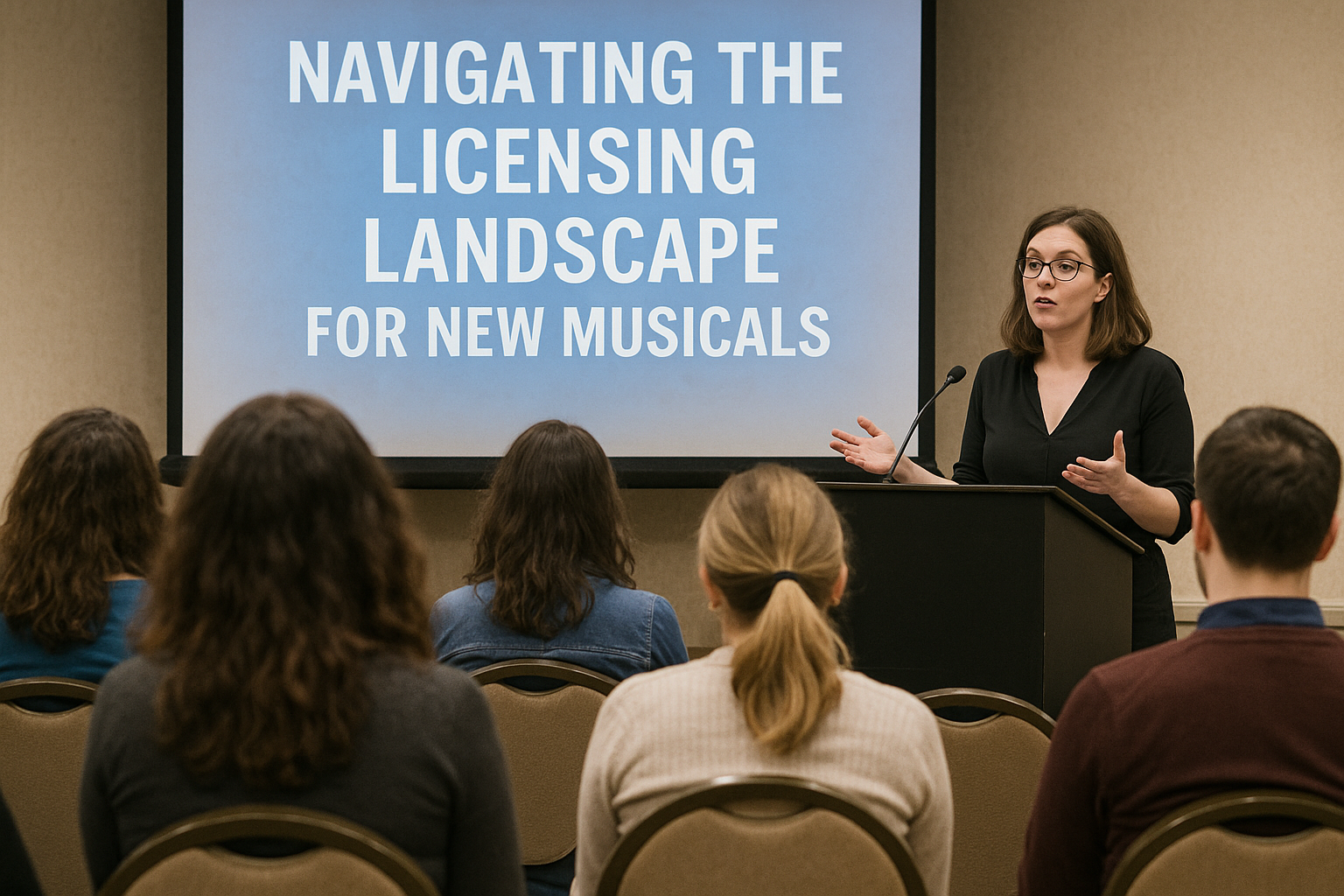Navigating the Licensing Landscape for New Musicals
By Broadwaytrax Content Studio · October 29, 2025
Updated October 29, 2025
Producing a new musical stirs excitement. The songs are fresh, and the audience feels engaged. But when it comes to licensing, things are different from older shows. As you prepare to put on a new musical, understanding the rules is key. This guide will help you stay on track and maintain that special energy.
What Makes New Musicals Different?
When a show is on Broadway or touring, amateur rights often pause. This helps protect professional productions. Licensors release amateur rights later, sometimes alongside school or teen editions suitable for younger performers. It’s normal, not a setback, and it helps grow the theater community (MTI).
Understanding Your Rights
When you perform a full musical with characters and scenes, you need grand rights from the rightsholder. A single song sung without a story is covered by small rights, which your venue’s blanket license usually includes. If you livestream or record, sync rights are also necessary. Additionally, for any audio releases, mechanical licenses are needed to use the music. Using an existing cast album also requires a master use license. Keep in mind that copyright protects both the song and the specific recording, which are different (U.S. Copyright Office).
Streaming Considerations
Since 2020, licensors have created add-ons for livestream and on-demand access. These specify platforms and areas where you can stream. Grand rights don’t cover streams, so you must plan for sync permissions. Also, clarify if you can make archival or promotional clips. Not all short social media posts or archives are permitted, so get these details in writing (MTI).
Steps for Producers
If your musical is based on a book, film, or a real-life story, you need to secure those rights first. Then, set clear agreements with your writers regarding credit and payments for readings and workshops. New musicals often have strict rules about changes to orchestrations, keys, and staging. Authors control these aspects, so always check before making alterations (Dramatists Guild).
When negotiating your grand rights license, define things like scope, term, venues, materials, and billing. Confirm what can be changed or not. If you plan to stream, include a sync clause detailing platforms and dates. Make a plan for updating scripts or scores smoothly. Keep all licenses, cue sheets, and receipts organized in one location.
Guidance for Educators
Start early by checking the title’s availability with the licensor. Ask about school or teen editions. Some companies offer programs for schools to test new works. If the show isn’t ready, consider a concert version, which usually falls under small rights coverage. If you want to stream, ensure you have sync rights. Avoid using unapproved PDFs or tracks to protect your program's reputation (MTI); (U.S. Copyright Office).

Tips for Performers
Singing a song from a new show at a cabaret is typically fine under the venue’s PRO license. However, posting that song online requires a sync license from the publisher. Using an original recording as a backing track also needs permission. It’s safer to use your own clean piano track. Be careful not to change lyrics or mix songs without permission, as new works often enforce these rules closely to protect the authors (U.S. Copyright Office); (Dramatists Guild).
New Opportunities Ahead
Looking into future seasons, there are more choices emerging. Licensors now offer livestream and on-demand packages, making it easy for schools to have virtual access. More school editions are becoming available earlier. Collaboration between universities and regional theaters to create new pieces is also growing. If you want early access, inquire about piloting programs or workshops (MTI).
Budgeting and Planning
Separate your budget for grand rights, materials, streaming add-ons, and recorded media. Be patient with approval requests for changes, as new shows may take time for adjustments. If you plan to stream, understand your platform options and how to limit access. Ensure you’ve cleared necessary permissions before filming anything.
If you learn a title is unavailable, don’t get discouraged. Ask if you can join a waitlist or explore concert permissions. You could also create a showcase that includes cleared materials while waiting for a full title release (MTI).
Legal Note
Your work is protected the moment it’s created. Registration is not needed for protection, but you must register to sue. Timely registration could unlock special remedies. This fact influences how new musical writers handle approvals and timelines (U.S. Copyright Office).
Licensing a brand‑new musical or prepping a workshop? Get bespoke, legally clean rehearsal or demo tracks built from your licensed materials—perfect for readings, labs, and school pilots this season.
Start Your ProjectFinal Tip
Choose vendors who respect licensing rules. Ensure any rehearsal or demo tracks are made from approved materials. Clean documentation can save you time and help keep your focus on the story.
New musicals invite us to listen and create with care. By following the legal guidelines, you can give your production the best chance to succeed.